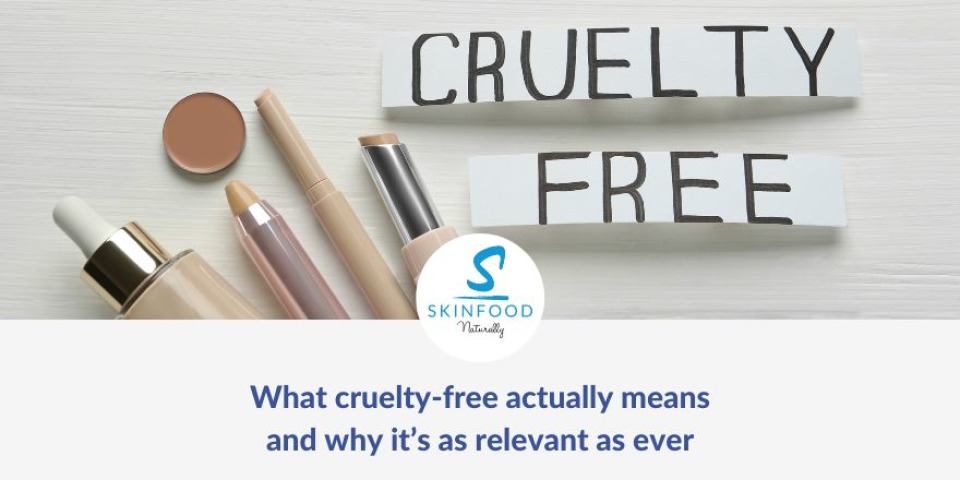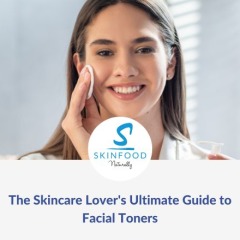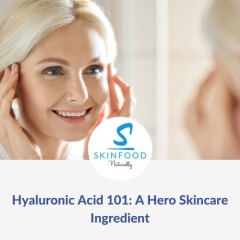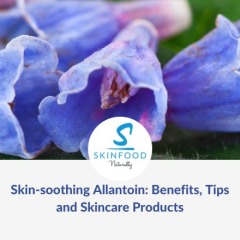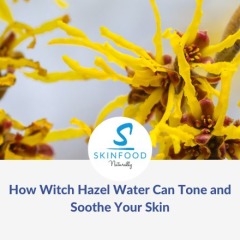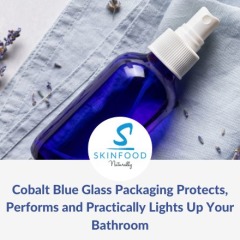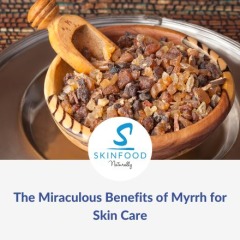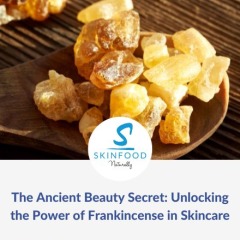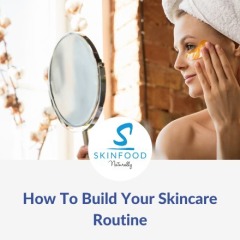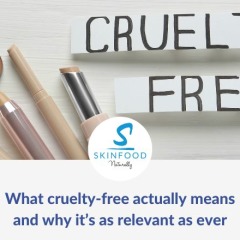“I don’t believe that suffering should be inflicted upon defenceless animals for human gain, be this pharmaceutical/medical or the products of the beauty industry,” says Sarah Butler, Founder of Skinfood.
Animal cruelty is a major issue for many of us, and we want to avoid using
products that have been tested on animals. Cruelty-free skincare products are beauty items that have not been tested on animals. Therefore, companies producing these products have not subjected animals to any testing to ensure the safety of their products.
Cruelty-free skincare is vital because it is a more ethical way of producing skincare products. However, animal testing is still conducted for many conventional skincare products, even though alternative methods are available that do not involve animals. Animals are, therefore, often subjected to harsh chemicals and procedures that can cause them pain and suffering. Cruelty-free skincare brands do not test on animals, so you can be sure that their products have not caused any animal suffering.
What does cruelty-free mean to consumers?
From a quick Google search, it seems that shoppers vary in their opinions on cruelty-free skincare. Some shoppers claim it’s extremely important to them and they will not buy products tested on animals, while others say that they don’t mind if a product is tested on animals as long as it is effective. The importance of cruelty-free skincare to shoppers is largely dependent on the individual.
Historically, animal testing has been carried out before products with a beauty or hygiene claim were made available for sale on the market. Today, increasingly, skincare consumers expect cruelty-free skincare products as industry-standard and therefore actively seek out brands that make this part of their ethos.
At Skinfood, cruelty-free means that our products are never tested on animals and our ingredients aren’t either. We don’t purchase from or work with any suppliers who have links with animal testing. Nor will we sell directly into countries where animal testing is a government requirement for products to be stocked by retailers in that country.
Advances in technology, stem-cell research and biomedical science mean that new ways of safety-testing products are being discovered and developed. And as a result, we don’t need to continue with animal testing. At Skinfood, our hope is that this becomes a standard and normal practice in the future. However, while these are still in development, these methods are not mainstream and expensive, which is why certain countries still require animal testing for market entry.
Choosing ethical skincare
Increasingly, beauty consumers live ethical lifestyles characterised by their choices in skincare, nutrition, exercise and work/life balance. Product formulations, packaging and marketing, can all significantly impact the environment. Picking out ethical and conscious skincare products that are kind to people, animals, communities and the wider world is considered a great way to make conscious decisions that look after our planet.
Beauty companies are making cruelty-free skincare more available because consumers are becoming more aware of the ethical implications of using cosmetics that have been tested on animals. As a result, beauty companies are reformulating their products to be cruelty-free and are investing in developing new methods of testing that do not involve animals. This is good news for both consumers and animals, as fewer animals will suffer in the name of beauty.
Does cruelty-free mean vegan?
Cruelty-free and vegan are two separate (but closely interlinked) sets of ethical standards with different certification processes.
Although at Skinfood, we hold both types of certification, they both mean different things. Cruelty-free means that a product is developed without testing on animals, while vegan means that the product does not include any animal-derived ingredients.
Science backs cruelty-free skincare
As well as its ethical nature, cruelty-free is backed by science as an effective form of skincare. Cruelty-free skincare products do not contain any ingredients that have been tested on animals, and they are also often made without any animal by-products. Cruelty-free skincare products are usually vegan and organic, ensuring they are not contributing to animal cruelty.
Testing skincare products
Products go through various safety and challenge tests to ensure that they are safe for the public to use and fit for purpose. Stability tests ensure that a product can withstand temperature, humidity, and light changes and is not adversely affected or spoiled. They also ensure that the skincare product’s preservative system is effective.
Tests help determine a product’s shelf-life, the safe-use period after opening and directions for storage and use. Any ingredients used in licensed cosmetic products must have the appropriate safety documentation to accompany them. These documents are produced following rigorous testing to outline each ingredient’s safe usage amounts, storage, disposal and chemical makeup (which refers to the natural compounds each ingredient contains). Formulators use these documents and other regulatory guidance, such as information on dermal limits for the safe use of essential oils, to design safe, effective products for consumers.
The EU has strict policies on ingredients that are accepted for use and stringent guidelines on the amounts of these ingredients that a certain type of product is allowed to contain. Each product must be submitted to the regulatory portal and its documentation and precise labelling must be approved before registration. Only once this process is complete can a product be legally sold to the public.
Measuring effectiveness of skincare products
Therefore, measuring the performance and efficacy of products via the EU process is stringent and robust. As formulators, we cannot make certain claims about efficacy under the EU regulations unless we undertake expensive clinical trials.
As a small brand, Skinfood can’t pursue these types of trials. Instead, we have a host of existing customers and willing volunteers who test the products themselves and report their observations about how a product smells, how easy it is to wash off, how long it takes to absorb, how it makes their skin feel and what changes they perceive to the condition of their skin.
Customers also take before and after photos, which enable us to show others exactly what our products do. Our customers also write their reviews on Google and as testimonials so we can share their experiences with others. We’re so grateful! And it shows just how vital reviews and testimonials from customers and testers are for a small brand like ours.
Cruelty-free certifications
Cruelty-free skincare products are often labelled as ‘not tested on animals’ or ‘cruelty-free’. There are several ways to find cruelty-free skincare products, including looking for labels like “cruelty-free” or “not tested on animals,” checking out online databases of cruelty-free companies and asking manufacturers directly.
Legislation, certifications such as Leaping Bunny and campaigns like the Humane Society International’s Be Cruelty-Free have driven the cruelty-free stance among skincare brands in the beauty industry.
When looking to invest in skincare that is kind to you, your body and the environment — and animals— it’s important to verify the company’s certifications. The most well-known cruelty-free certification is
PETA’s Beauty Without Bunnies (or soon, Bunnies) since it is a front-runner in the movement. Other credible certifications, such as Leaping Bunny, Choose Cruelty-Free and the National Institute of Cruelty-Free Animal Testing (NICE), also guarantee animal-friendly products.
Our products have undergone rigorous appraisal to be certified as cruelty-free and this ensures that it’s easy for customers to look for the cruelty-free Leaping Bunny logo to find skincare products that meet their ethical standards.
The law behind cruelty-free skincare
The regulation of cruelty-free skincare products is overseen by the
cosmetics directive, which sets out the testing ban and marketing ban in the EU, and reflects the strength of consumer demands for skincare products that are not tested on animals.
In the UK, the advertising of any products which have been tested on animals is regulated by the CAP (Broadcast) TV Code and BCAP (Non-broadcast) TV Code, both of which are administered by the Advertising Standards Authority (ASA). These codes state that adverts must not cause serious or widespread offence and must not be misleading, harmful or offensive.
The advertising of cosmetics and skincare products is also regulated by the Cosmetic Products (Safety) Regulations 2008. These regulations state that all cosmetics and skincare products must be safe for human use and must not be tested on animals.
The future of cruelty-free skincare
Cruelty-free skincare has continued to resonate with consumers. It has become a more ethical and sustainable option for people.
In 2022, skincare consumers will continue to push brands to halt all use of animals for testing and branding efforts, including using technology to simulate human skin or reproduce the results of animals and call on them to fully go vegan.
Looking ahead, the future of cruelty-free skincare looks promising. More and more brands are committed to not testing their products on animals, and there is a growing demand for cruelty-free products. The rise of cruelty-free is likely to continue as people become more aware of the issue and the importance of choosing cruelty-free products.
